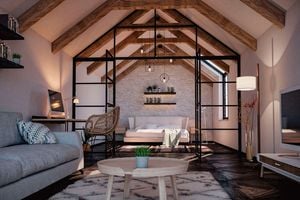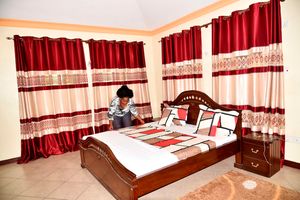
Aparthotels borrow from hotels, traditional serviced apartments and Airbnbs while filling in glaring gaps created by all these other models.
Over the past decade, short stays have become a go-to investment option for many people buying apartments in Kenya. Airbnbs have been perceived as a gateway to increase revenues beyond the usual long-term rentals.
And while Airbnbs have served their purpose, the hospitality industry is changing, and travelers have new demands.
In 2024, short-term rental businesses in Kenya were rocked by controversy amid rising cases of insecurity and murders. It seemed that short stay property owners were finding it difficult to vet the guests booking their facilities.
But does that mean going back to traditional hotels? What about small scale investors who still want to invest in apartment units and capitalise on the growing hospitality sector?
Airbnbs will continue to have a place in the short rental industry due to the many benefits they possess beyond the disadvantages.
Beyond traditional hotels and Airbnbs or rental sharing models, a third model is disrupting the short stay sector in Kenya.
Aparthotels borrow from hotels, traditional serviced apartments and Airbnbs while filling in glaring gaps created by all these other models.

Short-term rentals have been around for decades, often morphing and taking different forms over time.
In this edition, we explore changing travel trends such as the rise of “bleisure” travel, demand for security and convenience, affordability and a new generation joining the travel wagon, as well as how the aparthotel model is addressing these demands.
The Covid-19 era short stay boom
Sally Kimutai, Head of Business at Nanga Property Developers, an aparthotel developer, says the interest in short stays peaked during the pandemic.
“Short stay businesses started booming during the pandemic lockdowns as more people started travelling locally to beat boredom. Investors started inquiring on whether they could convert their long-term rental units into short-term stay to maximise their income,” she says, and adds,
“At the time, long-term rentals were struggling to maintain high occupancy rates as some renters lost income due to economic shutdown. Some property owners had to subsidise their rent to retain tenants. Meanwhile, people who were staying indoors wanted a change of scenery.

Sally Kimutai is the Head of Business at Nanga Property Developers.
"They started looking for staycations and there was a boom in the Airbnb business. In fact, it's the tenants who started converting their rented units into short stays at first.
"Property owners noticed the trend and began inquiring on how they can maximise their returns, since their tenants seemed to be making more money off of their properties.
"If on average a property owner was making Sh15,000 a month with a long-term tenant, they could make up to Sh30,000 to Sh40,000 with short-stay bookings.”
Short-term rentals have been around for decades, often morphing and taking different forms over time.

Short-term rentals have been around for decades, often morphing and taking different forms over time.
From inns to taverns, vacation homes, lodges and five star hotels. However, it was in 2008 and when Airbnb, the rental-sharing model, was introduced that the short stay industry was truly disrupted.
Airbnbs filled glaring gaps created by traditional hotels such as affordability, flexibility and the ability for travellers to truly immerse themselves in the places they visited.
Glaring gaps
Although the Airbnb business model took the hospitality industry by storm, over time, people have noticed gaps within this model too.
For instance, Sally says, one of the biggest challenges Airbnb owners face is the amount of time it takes to manage just one unit.
“Many short stay owners have full time jobs, they may even be in another country. And sometimes these businesses fail because guests are not getting the attention they need, especially if the owner decides to manage the unit by themselves.
Most Airbnbs are also located in apartment complexes where other units are rented out to long-term tenants. Short stay tenants have very different needs compared to long stay tenants, so mixing them up is challenging in a number of ways,” Sally points out.
A short-term stay tenants may want to check in at late hours, sometimes they want food but there are no hotels around.

A short-term stay tenants may want to check in at late hours, sometimes they want food but there are no hotels around.
Short-term stay units also demand tighter security, not just for the visitors, but also for the owner because sometimes, guests take advantage of the poor security.
Shifts in travel trends
There are many loopholes that need to be fixed, and while traditional hotels still have their place in hospitality, the idea of travel itself is changing drastically.
In 2024 for instance, Kenya saw a significant increase in business travel. The country hosted multiple global and continental summits and is poised to host more in 2025.

Most Airbnbs are also located in apartment complexes where other units are rented out to long-term tenants.
In addition to increased business travel, travelers are also transitioning from strictly business to “bleisure”- a combination of business and pleasure. Booking.com, one of the largest short stay booking platforms, predicts that “bleisure” travel is expected to increase in 2025 - with companies reporting that their employees want to explore tourism during business travel.
This reality will undoubtedly force the hospitality industry to rethink accommodation and service delivery.
Other factors shaping hospitality include the rise of sustainability movements, which makes travellers more conscious of how they move around during travel.
With rising geopolitical tensions around the world, security is becoming a big concern for travellers. Booking.com also predicts that boomers are joining the adventure caravan and will demand a different set of needs to the hospitality industry.
Although both Airbbnb and traditional hotels still have their place in the hospitality industry, they cater to different needs.
Traditional hotels predominantly serve business travellers while Airbnbs serves leisure travellers, families travelling in large groups and the in-betweeners.
But changing needs are fueling the rise of aparthotels. Though not an entirely new model, aparthotels are now emerging as the next option for people seeking a blend of traditional hotels and Airbnbs.
From an investment perspective, aparthotels also tick several boxes for real estate investors who want to invest in short-stays.
Ideally, an aparthotel provides self-catering experiences just like Airbnbs but with additional hotel-like facilities such as restaurants, professional hospitality staff, conferencing facilities and harmonised management.
But unlike serviced apartments which are often owned by one company, each unit in an aparthotel can be owned by individual investors.
In an aparthotel complex with, let’s say 40 studio units (all designated for short stays), different buyers can own these units and earn monthly rental returns from the units.
There are a few things to analyse when buying an aparthotel, here in Kenya. Essentially, these kinds of units are trying to tap into the hospitality industry.

An aparthotel provides self-catering experiences just like Airbnbs but with additional hotel-like facilities such as restaurants, professional hospitality staff, conferencing facilities and harmonised management.
They have to be in traditional hospitality hotspots, unlike Airbnbs which can be located anywhere.
The location has to be accessible to airports, malls, restaurants, roads, fun activities and tourism attractions.
They are likely to be closer to where you find hotels because the guests are looking for leisure.
Management is also important. Some aparthotel developers will allow you to manage your unit, and in other cases, all units are placed under one management company. In the case where your unit is managed by the developer or an outsourced company, Sally stresses on evaluating the company’s capacity.
“Will they manage operations and marketing efficiently? This is the biggest headache for every short-stay business. How will the guest reception be handled? An investment in the short stay business should be as passive as possible without involving too much of your time or extra supervision,” she says
Unit typology
When it comes to choosing the right unit, the typology is very important, based on the location.
“Different locations attract different types of guests. For instance, there are locations that attract families going on vacation and such guests need big spaces. But there are locations where travellers travel alone and need smaller units.
This is an extremely important aspect to consider when buying an aparthotel unit”.
Still on typology, you have to look into projected occupancy rates in a studio or one bedroom in relation to unit charges per booking.
“If, for instance, you spend Sh5 million on a studio unit, how do you get the best returns, versus spending 10 million on a larger unit, let’s say a two bedroom? Ultimately, you need to pick a unit that gives you the highest possible occupancy rates”.
Beyond property price tags
You also need to understand costing. If you're investing in an aparthotel, over and above the purchase cost, you might incur furnishing cost and a management fee.
If you do not anticipate these operational costs, you might be frustrated. It's not much in many cases, compared to the income, but you have to inquire and be clear on this.
Lasty, Sally explains, aparthotel units are a business and the income is not fixed. Like any other hospitality business, there are off-peak and peak seasons. In the off-peak season, the charges might be slightly lower and higher during the peak season.
Being flexible with the pricing helps to attract more people during off-peak seasons, while maximising returns during peak seasons. Over time you get to understand your unit's seasons and manage your finances better.
It is important to understand travellers’ needs in 2025.
“One thing coming out clearly is the sensitivity attached to the cost of accommodation. Airbnbs have been very successful in hospitality because they charge less than traditional hotels.”
In addition, Airbnbs don't charge per head, which gives them an advantage, but hotels charge per head, although they have value additions like breakfast and amenities like swimming pools.
They also have professional staff who know how to deliver a proper hospitality experience. For a while, Airbnb guests have enjoyed flexible perks like cooking own meals and a homely feel.
And while people still want the flexibility and pricing of an Airbnb, they also want the convenience of a hotel.
For instance, they want recommendations for different tourism hotspots within the area, airport pickups, or the option to order from a nearby restaurant rather than cook. These guest demands will shape short stay businesses moving forward, Sally points out, adding that these preferences might influence the demand for aparthotel experiences.
Diversifying revenue streams
Finally, when it comes to making money from an aparthotel unit, the main source of revenue for short stays is occupancy.
However, Sally suggests additional revenue streams such as hosting organisations for strategic meetings through conferencing facilities - if one is incorporated in aparthotels.
Those running the restaurant within the aparthotels can also market to guests from outside. Unit owners should also consider creative packages for guests.
“You can offer additional activities such as visits to close by national parks or other tourism hotspots. Offering these extra activities can be a good source of income.”











